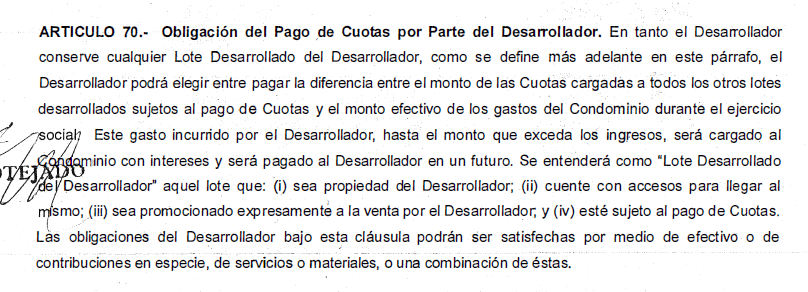Prohibition of HOA Fee Waivers in Baja California
Under the Ley Sobre el Régimen de Propiedad en Condominio de Inmuebles para el Estado Libre y Soberano de Baja California, the waiver or exemption of HOA fees by any entity, including the Administrator or the Developer, is explicitly prohibited.
Relevant Legal Framework
Article 60:
- Text: "Las cuotas de administración y mantenimiento no estarán sujetas a compensación, excepciones personales ni algún otro supuesto que pueda excusar su pago."
- Key Points:
- Administrative and maintenance fees are mandatory.
- No exceptions or compensations are allowed.
- This prohibition applies universally to all condominium owners, including the Administrator, Developer, and individual unit owners.
Article 58:
- Text: This article reinforces the obligation to contribute proportionally to common expenses.
- Key Points:
- Fees are based on each owner's percentage of indiviso (shared ownership of common areas).
- All owners, including the Developer, are required to pay these fees for any unsold units they own.
Legal Hierarchy in Mexico
Supremacy of State Law:
- State laws, like the Ley de Condominios, take precedence over internal condominium rules (Reglamentos internos).
- If internal rules conflict with state law (e.g., by allowing fee waivers), the state law overrides them, and those provisions in the Reglamento are invalid.
Role of Internal Rules:
- Internal rules bind the condominium community but must align with state law.
- If the internal rules allow for fee waivers, they are unenforceable because Article 60 explicitly prohibits such actions.
Implications in Case of Conflict
If Internal Rules Allow Waivers:
- The Ley de Condominios supersedes any internal rule permitting waivers.
- A judge or mediator would rule in favor of the state law, declaring the conflicting internal rule null and void.
Legal Consequences:
- An Administrator or Developer acting under invalid internal rules could face:
- Civil liability: For any financial harm caused to the condominium.
- Criminal liability: If actions are deemed fraudulent, abusive, or harmful to the condominium’s finances.
When Could It Be Criminal?
1. Fraud (Fraude):
- Scenario: The Administrator waives fees for themselves or others without legal justification.
- Legal Basis: Fraud occurs when harm is caused or benefits are gained through deception or misuse of authority.
- Risk: Violates trust and may defraud condominium owners.
2. Embezzlement (Administración Fraudulenta):
- Scenario: Misuse or misappropriation of funds intended for condominium maintenance.
- Legal Basis: Articles 223 and 224 of the Federal Penal Code criminalize the fraudulent administration of funds.
- Risk: Financial harm to the condominium.
3. Abuse of Authority (Abuso de Confianza):
- Scenario: The Administrator improperly waives fees, harming the condominium’s collective finances.
- Legal Basis: Abuse of trust occurs when someone in a position of authority acts against the interest of those they represent.
- Risk: Could lead to civil or criminal charges.
4. Harm to Collective Property or Finances:
- Scenario: Waiving fees reduces available funds for maintenance and repairs, directly harming the property’s condition.
- Legal Basis: Intentional harm to the condominium’s finances could escalate to criminal liability.
Practical Implications for LVDM Owners
Supervision by Assembly and the Surveillance Commitee:
- Both the Assembly of Condominium Owners and the Surveillance Committee must monitor the actions of the Administrator to ensure compliance with the law and to prevent irregularities in the management of fees and condominium funds
- The Surveillance Committee, as an auxiliary body of the Assembly, is responsible for overseeing proper administration and reporting any detected irregularities.
Enforcement:
- Any attempt to waive fees should be challenged immediately, as it violates state law.
Administrator’s Duties:
- The Administrator is legally obligated to collect fees from all property owners without exception.
Below is the Article 70 that is we believe is in conflict with the law

